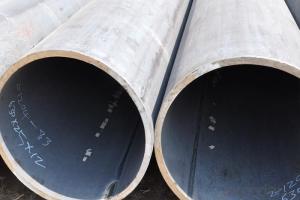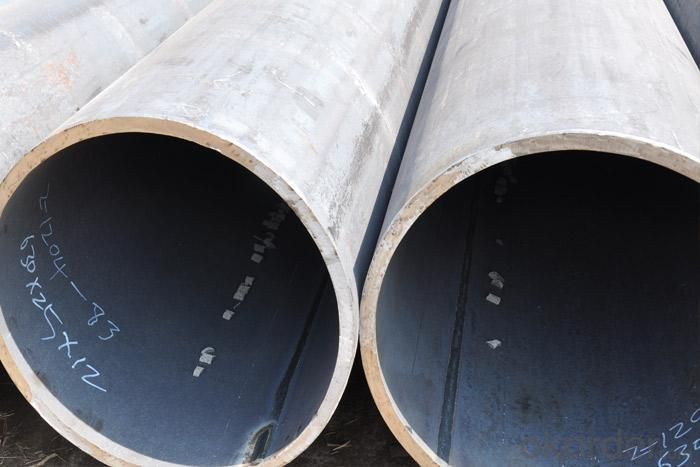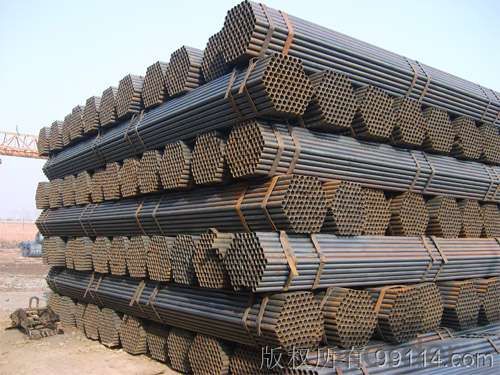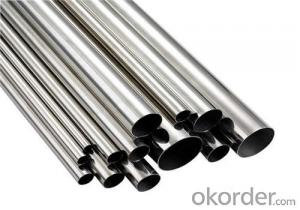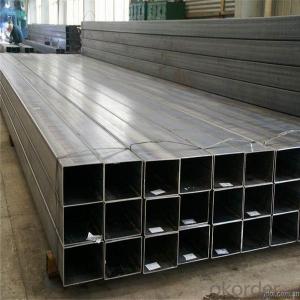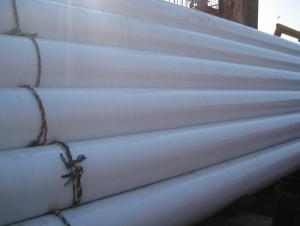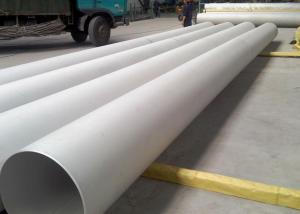Welded Water Steel Pipe Oil Gas Pipe Steel Pipe
- Loading Port:
- Tianjin
- Payment Terms:
- TT OR LC
- Min Order Qty:
- 25 m.t.
- Supply Capability:
- 6500 m.t./month
OKorder Service Pledge
OKorder Financial Service
You Might Also Like
1、Welded Water Steel Pipe GB9711.2:
GB9711.2 Water Steel Pipe is electric resistance welding, the abbreviation for Oil for transporting oil and natural gas vapor liquid objects, can meet the requirements of high and low pressure, the transport in the world with pipe sector accounted for a pivotal position.
2、Main Features of Welded Black Water Steel Pipe GB9711.2:
• High manufacturing accuracy
• High strength
• Good visual effect
• Reasonable price
• Small inertia resistance
• Strong heat dissipation ability
3、Welded Black Water Steel Pipe Specification GB9711.2:
Standard | GB, DIN, ASTM ASTM A106-2006, ASTM A53-2007 |
Grade | 10#-45#, 16Mn 10#, 20#, 45#, 16Mn |
Thickness | 1 - 33 mm |
Section Shape | Round |
Outer Diameter | 21 - 610mm |
Place of Origin | Tianjin, China (Mainland) |
Secondary Or Not | Non-secondary |
Application | Hydraulic Pipe |
Technique | Cold Drawn |
Certification | API |
Surface Treatment | factory state or painted black |
Special Pipe | API Pipe |
Alloy Or Not | Non-alloy |
Length | 5-12M |
Outer Diameter | 21.3-610mm |
Grade | 20#, 45#, Q345, API J55, API K55, API L80, API N80, API P110, A53B |
Standard | ASME, ASTM |
1) Material:20#(ASTM A 106/A53 GRB.API5LGRB,GB),45#,16Mn,10#.
2) Specification range:OD:21.3-610mm,WT:6-70mm,length:6-12m or according to the requirement of clients.
3) Excutive standards:GB,ASME API5L.ASTM A 106/A53,Despite of the above standards,we can also supply seamless steel pipe with standard of DIN,JIS,and so on,and also develop new products according to the requirements of our clients!
4) Surface:black lacquered,varnish coating or galvanized.
5) Ends:Beveled or square cut,plastic capped,painted.
6) Packing:bundles wrapped with strong steel strip,seaworthy packing.
4、Packaging & Delivery
Packaging Details: | seaworthy package,bundles wrapped with strong steel strip |
Delivery Detail: | 15-30days after received 30%TT |
5、FAQ of Welded Black Water Steel Pipe GB9711.2:
①How is the quality of your products?
Our products are manufactured strictly according to national and internaional standard, and we take a test
on every pipe before delivered out. If you want see our quality certifications and all kinds of testing report, please just ask us for it.
Guaranteed: If products’ quality don’t accord to discription as we give or the promise before you place order, we promise 100% refund.
②How about price?
Yes, we are factory and be able to give you lowest price below market one, and we have a policy that “ for saving time and absolutely honest business attitude, we quote as lowest as possible for any customer, and discount can be given according to quantity”,if you like bargain and factory price is not low enough as you think, just don’t waste your time.Please trust the quotation we would give you, it is professional one.
③Why should you chose us?
Chose happens because of quality, then price, We can give you both.Additionally, we can also offer professional products inquiry, products knowledge train(for agents), smooth goods delivery, exellent customer solution proposals.Our service formula: good quality+good price+good service=customer’s trust
SGS test is available, customer inspection before shipping is welcome, third party inspection is no problem.
6、 Welded Black Water Steel Pipe Images GB9711.2:
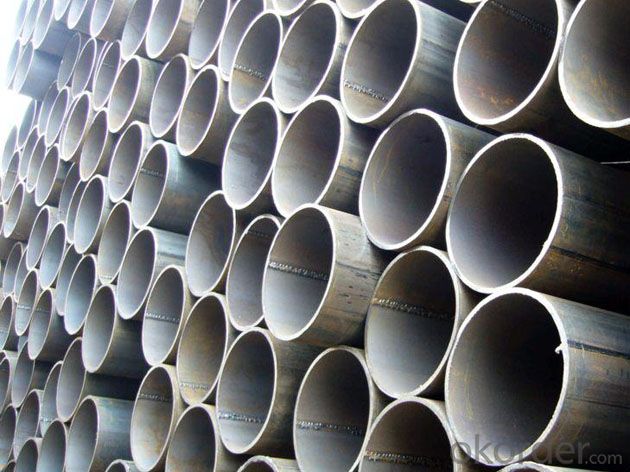
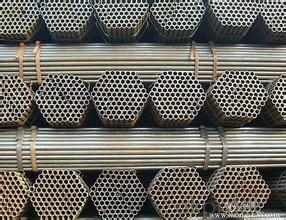
- Q: What is the production process of seamless steel tube?
- Main production process of cold rolled (drawn) seamless steel tube:Blank preparation, pickling, lubrication, cold rolling (drawing), heat treatment, straightening, finishing and inspectionThe production process of seamless steel tube in general can be divided into two kinds of hot rolling and cold drawing, cold-rolled seamless steel pipe production process than hot-rolled billet to complex, first to three roller rolling and extrusion to sizing test, if the tube through the cutting machine cutting surface without crack growth response after cutting blank about one meter. Then enter the annealing process, annealing and pickling to use acid pickling liquid, should pay attention to the surface if there are a lot of bubbling, if there are a large number of bubbling pipe shows that the quality is not up to the standard. The appearance of cold rolling seamless steel tube shorter than hot-rolled seamless steel pipe, cold rolled seamless steel pipe wall thickness is generally higher than hot-rolled seamless steel pipe to be small, but the surface looks better than thick wall seamless steel pipe is more bright, rough surface is not too much, not too much burr diameter.
- Q: How are steel pipes used in desalination plants?
- Steel pipes are used in desalination plants for transporting and distributing water throughout the plant's various processes, such as intake, pre-treatment, reverse osmosis, and post-treatment. They are preferred due to their durability, corrosion resistance, and ability to withstand high pressure and temperature conditions. Steel pipes ensure the efficient and reliable conveyance of water, contributing to the overall effectiveness of desalination plants in producing freshwater from seawater.
- Q: What are the different coatings used on steel pipes?
- There are several different coatings used on steel pipes, including but not limited to, epoxy coatings, fusion bonded epoxy (FBE) coatings, polyethylene coatings, and zinc coatings. These coatings are applied to steel pipes to protect them from corrosion, increase their lifespan, and improve their performance in various environments.
- Q: How are steel pipes coated for insulation purposes?
- Steel pipes are commonly coated for insulation purposes using various methods and materials. One common method is the application of a thermal insulation coating. This coating is usually a high-performance polymer or epoxy-based material that is applied to the surface of the steel pipe. Before the coating is applied, the steel pipe is usually cleaned thoroughly to remove any dirt, grease, or rust that may be present on its surface. This is typically done through a process called abrasive blasting, where small particles are propelled at high speed to remove contaminants and create a clean, rough surface for the coating to adhere to. Once the surface is prepared, the thermal insulation coating is applied using different techniques such as spraying, brushing, or rolling. The coating is carefully applied in multiple layers to ensure proper coverage and thickness. This helps to create a barrier between the steel pipe and the external environment, preventing heat transfer and minimizing energy loss. In addition to thermal insulation coatings, steel pipes can also be coated with materials such as polyurethane foam or mineral wool. These materials provide excellent thermal insulation properties and are often used in applications where high-temperature resistance is required. Overall, steel pipes are coated for insulation purposes through a combination of surface preparation and the application of specialized coatings. These coatings help to reduce heat loss, increase energy efficiency, and protect the steel pipe from corrosion and other environmental factors.
- Q: What are the limitations of using steel pipes?
- There are several limitations to using steel pipes in various applications. Firstly, steel pipes can be quite expensive compared to other materials such as plastic or copper. This cost factor can be a significant limitation for projects with tight budgets. Secondly, steel pipes are susceptible to corrosion. Over time, exposure to moisture and certain chemicals can cause steel pipes to rust and deteriorate. This can lead to leaks, reduced structural integrity, and ultimately, the need for costly repairs or replacement. Another limitation of steel pipes is their weight and rigidity. Steel pipes are generally heavier and less flexible than other types of pipes, making them more challenging to install and maneuver in certain settings. Additionally, their rigid nature makes them less suitable for applications that require significant movement or flexibility. Furthermore, steel pipes can be prone to thermal expansion and contraction. When exposed to extreme temperatures, steel pipes can expand or contract, potentially causing stress on joints, fittings, or other components. This can lead to leaks or even pipe failure if not properly accounted for. Lastly, steel pipes are not as resistant to certain chemicals or substances as other materials. Some chemicals can corrode or erode the inner lining of steel pipes, compromising their integrity and potentially causing contamination or leakage. While steel pipes have many advantages, it is important to consider these limitations when deciding on the most suitable material for a specific application.
- Q: How do you calculate the deflection of a steel pipe?
- To calculate the deflection of a steel pipe, you can use the formula for beam deflection, which takes into account the pipe's dimensions, material properties, and applied load. The specific equation you would use depends on the type of loading and support conditions. However, generally, you would need to determine the moment of inertia of the pipe cross-section, the modulus of elasticity of the steel, and the applied load to calculate the deflection.
- Q: Can steel pipes be used for underground steam pipelines?
- Yes, steel pipes can be used for underground steam pipelines. Steel pipes are commonly used for various types of pipelines, including steam pipelines, due to their strong and durable nature. Steel pipes have the ability to withstand high temperatures and pressures, making them suitable for transporting steam underground. Additionally, steel pipes have excellent corrosion resistance properties, which is important for underground pipelines as they are exposed to moisture and potentially corrosive elements in the soil. Overall, steel pipes are a reliable and commonly used choice for underground steam pipelines.
- Q: Are steel pipes suitable for chemical processing plants?
- Steel pipes are commonly used in chemical processing plants due to their excellent strength, durability, and resistance to corrosion. Steel pipes, especially those made of stainless steel or alloy steel, can withstand high temperatures, pressure, and the corrosive effects of various chemicals. This makes them suitable for transporting and containing different types of chemicals in a safe and efficient manner. Additionally, steel pipes are easy to install, maintain, and repair, making them a cost-effective choice for chemical processing plants. However, it is important to select the appropriate type of steel and consider factors such as the specific chemicals being processed, the operating conditions, and any potential risks or compatibility issues. Regular inspections and maintenance are also essential to ensure the integrity and performance of steel pipes in chemical processing plants.
- Q: Are metal spiral tubes the same as metal bellows?
- The spiral tube called spiral steel tube or spiral welded pipe, the low carbon steel or low alloy structural steel strips in a helical line certain angle (called forming angle) rolled into a tube, then the tube welding seam made up, it can be used in narrow strip production of large diameter steel pipe. The pitch of a spiral pipe is much larger than that of a bellows.
- Q: How do steel pipes handle seismic activities?
- Steel pipes are highly durable and resistant to seismic activities. Their strong and flexible nature allows them to withstand the ground shaking during earthquakes without compromising their structural integrity. Steel pipes are designed to absorb and distribute the energy generated by seismic waves, minimizing the potential damage caused by earthquakes. Additionally, their high strength-to-weight ratio makes them ideal for withstanding the lateral forces and ground movements associated with seismic activities.
Send your message to us
Welded Water Steel Pipe Oil Gas Pipe Steel Pipe
- Loading Port:
- Tianjin
- Payment Terms:
- TT OR LC
- Min Order Qty:
- 25 m.t.
- Supply Capability:
- 6500 m.t./month
OKorder Service Pledge
OKorder Financial Service
Similar products
Hot products
Hot Searches
Related keywords
